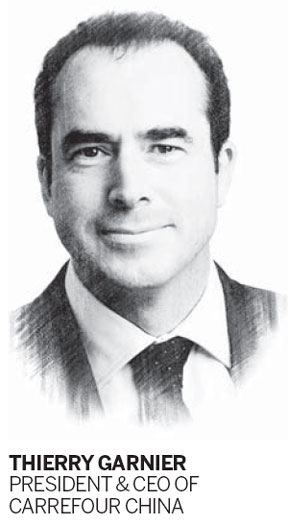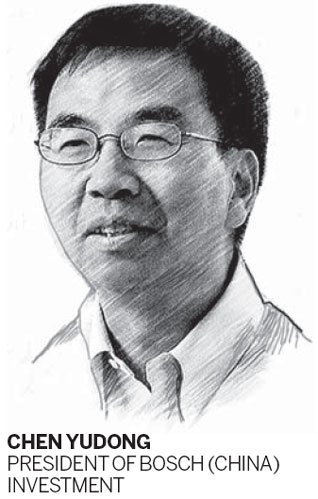Global firms wait with anticipation
Updated: 2013-03-08 07:32
(China Daily)
|
||||||||
Editor's Note: What the Chinese call the "two sessions," meaning the annual sessions of the National People's Congress, the top legislature, and the Chinese People's Political Consultative Conference National Committee, the top political advisory body, are not just China's own business.
And this year's two sessions are of particular importance because they will witness the lineup of a new government and a new cabinet, which will in turn guide and serve China's economic reform and development in the next five years as it has become the second-largest economic power and perhaps the largest trading country in the world.
Officials have said at the two sessions that China will make better efforts at reform and tap the vast potential of the country's 1.35 billion consumers.
So, to a great extent, the leadership team and the development program to soon arise from Beijing will be internationally significant and affect many companies around the world, especially those that are already holding large business interests in China.
We asked five executives from global businesses operating in China to share their opinions and ideas. What are their expectations and what are their concerns - now that both the country and the world are quite a way from the time when they just expanded into the newly opening-up China market in the 1990s?
Q1: What major issues do you expect members of the national legislature to address? And why?
Q2: What are the major challenges facing China in order to maintain a sustainable and steady economic growth?
Q3: What's your company's biggest concern when you do business in China?
Q4: What measures do you expect from the new leadership to help create a more favorable environment for your business and your industry?

A1
Continuously establish and improve the national food safety regulation and law mechanism.
A2
The rapid development of the Chinese economy and the purchasing power of the Chinese people bring great opportunities for the retail industry.
No matter whether international or local retailers expand in the business, the major challenges are product quality, service and supply chain integration, providing good-quality products at low prices, and driving forward the development of the business.
A3
Carrefour has over 200 stores in China, with some 60,000 employees, covering more than 60 cities. We serve more than 500 million customers every year. We are always shouldering our social responsibility and are committed to providing safe food for our customers.
A4
To better promote the building of a food safety system, we would like China to continue to strengthen its food safety system, improve food safety legislation, reinforce the monitoring and management of food from production to circulation, and rebuild public confidence in food safety.

A1
In my opinion, there are probably three hot topics in China's two sessions this year. The first one could focus on issues concerning people's livelihoods. People call for affordable houses, hope to receive medical treatment without worrying about the financial burden and want their children to get an education. Those concerns have also been highlighted by the new Chinese leadership. The second major topic is the environment. I observed many delegates' proposals focusing on "a beautiful homeland". The third one is urbanization. Recently, the Chinese media have begun to review past urbanization patterns. How to drive China's urbanization, promote orderly population mobility and guide a new way of life are all issues that need discussion.
A2
The courage to carry on the reform. It is amazing that China has solved food and clothing problems for a population of 1.3 billion in such a short period. Now the people are demanding more than to be fed and clothed. The government and people have higher expectations. To meet the people's greater demands and deepen the reform process will require courage.
A3
A free and fair environment for competition. Only under that condition can enterprises survive on their own and make themselves more competitive. Those enterprises cannot be defeated both in the domestic and overseas markets.
A4
From a macroeconomic perspective, the government needs to create a favorable business environment for enterprises to grow, but it should limit intervention at the micro-level. But the government also should take measures to improve people's livelihoods and increase their purchasing power, which will help boost domestic demand.

A1
Putting people and the environment first is China's plan to ensure continued economic growth that ultimately aims to achieve sustainable development. To achieve this goal, China needs to strengthen the implementation of innovative technologies, low-carbon development, universal healthcare coverage and innovation capabilities.
A2
The most pressing challenges China faces today include environmental pollution, clean and safe energy supply, adequate healthcare and food security. A key question is how the nation can continue to grow economically in a profitable yet sustainable way, as well as to rebalance the economy.
The new Chinese leadership stressed that in response to changes in both domestic and international economic developments, China should speed up the creation of a new growth model and ensure that development is based on improved quality and performance. A new target for economic growth has been set as doubling 2010 GDP and people's incomes by 2020. The new leadership also stressed the need for sustainable development with a focus on innovation and environmental protection.
We are very confident about China's future economic development in a sustainable and steady manner. The Chinese government has clearly stated that it will focus on quality growth during the 12th Five-Year Plan, and has set clear targets for agriculture, healthcare and energy efficiency.
A3
We would wish to have foreign enterprises on the same level as domestic companies, especially in restricted businesses such as seed production and animal vaccines, as well as in terms of subsidies and access to markets.
We would wish to strengthen the enforcement of IPR laws and measures to encourage innovation.
A4
a: Strengthen dialogue with multinational companies; b: As global experts in healthcare, crop protection and high-tech materials, we would wish to be involved even more actively during the drawing up of industrial policies and in R&D projects; c: Strengthen enforcement of IPR laws and measures to encourage innovation; d: Bayer will continuously strengthen its role as a leader in corporate citizenship, by contributing to sustainable development in China through innovative solutions and initiatives.
These include high-quality products, advanced technical standards and our cooperation with government, social groups and leading academic institutes.

A1
Over the past 10 years, China has made tremendous achievements in economic growth and social development.
We have seen a clear trend that the country will focus more on a faster shift away from the "export- and investment-driven" growth model to a more balanced approach, including a major focus on driving domestic consumption.
We are also glad to see that China will put more emphasis on living standards - health care, education, rural development, social insurance and environmental protection - and will attach great importance to food safety.
As a leading beverage company, Coca-Cola is committed to upholding the highest safety standards and providing world-class products to the Chinese market.
A2
Premier Wen Jiabao pointed out in his last government work report to the top legislature that "unbalanced, uncoordinated and unsustainable development remains a prominent problem".
As China continues to strengthen its innovation capabilities, optimize and upgrade its industries, and transform the country's economic growth pattern, we are confident that the country will be on the right track for sustainable growth.
A3
We are proud that Coca-Cola was one of the first foreign companies to come to the Chinese mainland market, in 1979.
Today, China represents Coca-Cola's third-largest market in the world, and we see tremendous growth opportunities and are looking to ensure we can continue to provide the best products to our customers here.
Overall, we believe it has become easier to do business in China as the country has integrated with the world economy.
We expect better transparency in laws and regulations and more flexibility in choosing business structures and partners, placing more requirements on companies but also creating a more predictable business environment.
A4
We believe that lots of multinational companies' business interests in China reflect China's "balanced growth" development strategy.
Coca-Cola has always been honored to be part of this great nation's business, cultural and social landscape.
We hope the country will continue to encourage efforts to speed up its globalization process, which will benefit all Chinese people.
In every market where Coca-Cola operates, including China, we are committed to investing locally, producing locally, hiring locally and acting responsibly in the communities where our businesses are located.
One challenge we at Coca-Cola are helping to address is that of growing the economy in a sustainable and environment-friendly way.
We believe that embedding sustainability into our strategy, operations and investment plans is part of our mission to inspire moments of optimism and happiness, and create value and make a difference to everyone we touch.
Hence we also welcome the opportunity to work with the Chinese government to explore policy options to encourage innovation investments.

A1
How to maintain sustainable and steady economic development and improve people's livelihoods and well-being are the major issues we expect members of the top legislature to address.
China has witnessed 30 years of rapid development. Such rocketing growth is a miracle in the global history of economic development and can hardly be repeated in the future.
Sustainable and steady development will be the next focus for China. Meanwhile, another important issue is to share with the people the benefits of economic development and improved livelihoods.
A2
The major challenges will be to improve productivity despite cost increases and also energy-saving and environmental protection.
With rapid development after opening-up and reform for 30 years, China's economic development will switch to a moderate pace.
Nowadays, as some costs, for example labor and raw materials, increase, maintaining business output will require productivity efficiency.
In the past, environmental destruction and energy shortages are the price we paid for economic development.
Now, air pollution in major cities like Beijing is a sign of the problems that industrial development brings.
Energy not only drives machines, but also powers a country's progress.
Exploration of renewable energy resources and maximizing the utility rate of fossil fuels would be the ideal solutions.
A3
A talent shortage and increasing labor costs are the main concerns today. To maintain competitiveness in its China operations, Bosch needs more talent.
This is no easy task. Meanwhile, given rising labor costs, improving productivity and maintaining profitability will also become a challenge.
A4
Regulations and plans for emissions reduction and the environment have taken effect in recent years, which shows the government's determination.
However, beyond control itself, we hope regulations and laws can be strictly implemented and monitored.
We also hope the new leadership will consider an incentive program for diesel cars to help reduce energy consumption.
(China Daily 03/08/2013 page17)

 In Photos: 7.0-magnitude quake hits Sichuan
In Photos: 7.0-magnitude quake hits Sichuan
 Li Na on Time cover, makes influential 100 list
Li Na on Time cover, makes influential 100 list
 FBI releases photos of 2 Boston bombings suspects
FBI releases photos of 2 Boston bombings suspects
 World's wackiest hairstyles
World's wackiest hairstyles
 Sandstorms strike Northwest China
Sandstorms strike Northwest China
 Never-seen photos of Madonna on display
Never-seen photos of Madonna on display
 H7N9 outbreak linked to waterfowl migration
H7N9 outbreak linked to waterfowl migration
 Dozens feared dead in Texas plant blast
Dozens feared dead in Texas plant blast
Most Viewed
Editor's Picks

|

|

|

|

|

|
Today's Top News
Live report: 7.0-magnitude quake hits Sichuan, heavy casualties feared
Boston suspect cornered on boat
Cross-talk artist helps to spread the word
'Green' awareness levels drop in Beijing
Palace Museum spruces up
First couple on Time's list of most influential
H7N9 flu transmission studied
Trading channels 'need to broaden'
US Weekly

|

|







